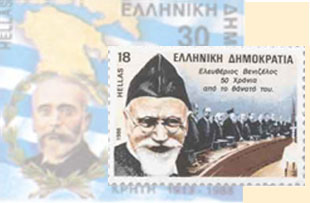Introduction
A correspondent of the Christian Science Monitor interviewed Professor A.Andreades in early May 1919 in New York. The interview was published in four instalments on May 2, 3, 6 and 7, respectively. The first two articles dealing with Greek diplomacy and the others discussing financial and economic matters. The information provided by Andreades is placed within the context of the Paris Peace Conference in 1919.
1.The scholar and Venizelist
Professor Andreades was President of the Anglo-Hellenic League in Athens and also a Professor of Law at the University of Athens. He belonged to Societe d’Economie (Paris), Royal Economic Society (London) and Academy of Political Science (New York).His academic credentials coupled with his membership of prestigious academic organizations made him eminently qualified to comment on Greek foreign policy.
He was an admirer of Greek Premier Eleftherios Venizelos. During 1914-18 war, the Anglo-Hellenic League supported Venizelos in his struggle with King Constantine over Greek foreign policy. Andreades also attended the Paris Peace Conference with the Greek delegation.
2. The foundations of Greek foreign policy.
Andreades came to the US to explain bases of Greek foreign policy to an American public who knew very little about Greece. The foundations of Greek foreign policy since the creation of Modern Greek State in 1830 rested on three principles according to Andreades. These were: 1. the liberation of Greek populations that were under foreign rule; 2 there would be referendum in areas which desired union with Greece; and finally Greece desired an understanding between peoples of the Balkans. He stated that “Greece desires that the liberation of the nations subject to Turkey should be completed and supplemented by a Balkan Federation.” To support his latter statement, he cited Rigas Feraios as the one who originally espoused the idea of a Balkan Federation in the 1790’s. He also mentioned that Ioannis Capodistrias (1776-1831) and Harilaos Tricoupis (1832-1896) espoused the same ideas. There is some truth to this assertion which requires a brief explanation.
Both of these political figures were very interested in foreign affairs but were more immediately concerned with internal affairs. Capodistrias arrived in Greece in January 1828 facing the problems of establishing a civil service, forming an educational system, reviving economic activity and introducing a currency and banking system. He was assassinated by George and Constantine Mavromichalis on October 9, 1831 as he was about to enter the church at Nafplion for having imprisoned some members of the Mavromichalis clan. Tricoupis was a reform-minded politician who sought improving Greece’s economic and political system before embarking on any foreign adventures. He improved the Greek armed forces and their training, raised the educational levels for civil positions, attracted foreign investment from overseas Greeks and also improved taxation collection. Venizelos carried out similar reforms like Tricoupis before Greece entered the Balkan wars in 1912-13.
3. The moderation of Venizelos and his critics
Andreades argued that Venizelos was a man of moderation by citing three examples to support his contention. Firstly Greece was pleased with the southern districts in Macedonia that had been awarded to her under the Treaty of Bucharest 1913. While she assisted Serbia in defeating Bulgaria, she had no desire in seizing “Monastir, Kroussovou, Ghevgeli, Stroumnitsa and Melenikon, although these cities are unquestionably Greek.”
Secondly, in Thrace Greece desired all territory to the south of River Arda. Whilst Constantinople was the capital of Thrace, Greece argued that this city should be internationalized. Andreades also mentioned that if the Greek and Armenian inhabitants of Constantinople were afforded to the opportunity “[they] would overwhelmingly vote in favor of joining up with Greece.”
Finally, he extolled Venizelos’ reasonableness with Greece repudiating her claims to Trebizond and Sinope containing Greek populations that were to be included in the future Armenian State. Andreades stated the Greeks outnumbered the Armenians in Trebizond.
|
Stavros Terry Stavridis was born in Cairo, Egypt in 1949 of Greek parents. He migrated to Australia with his parents in September 1952. Stavros has a Bachelor of Arts (B.A) in Political Science/Economic History and B.A (Hons) in European History from Deakin University and M.A in Greek/Australian History from RMIT University. His MA thesis is titled "The Greek-Turkish War 1919-23: an Australian Press Perspective."
Stavros has nearly 20 years of teaching experience, lecturing at University and TAFE (Technical and Further Education, the equivalent of Community College in the US) levels. He has presented papers at international conferences in Australia and USA and has also given public lectures both in Australia and on the West Coast of the US. Many of his articles have appeared in the Greek-American press. He currently works as a historical researcher at the National Center for Hellenic Studies and Research, La Trobe University, Bundoora, Victoria, Australia.
Stavros' research interests are the Asia Minor campaign and disaster, Middle Eastern history, the Assyrian and Armenian genocides, Greece in the Balkan Wars 1912-13 and the First World War and history in general.
HCS readers are invited to read articles that he has submitted to HCS. See the webpages on Smyrna and Asia Minor at the URL http://www.helleniccomserve.com/smyrneropener.html or see the section of HCS archives devoted solely to his seminal works at http://www.helleniccomserve.com/archivestavridis.html.
|


